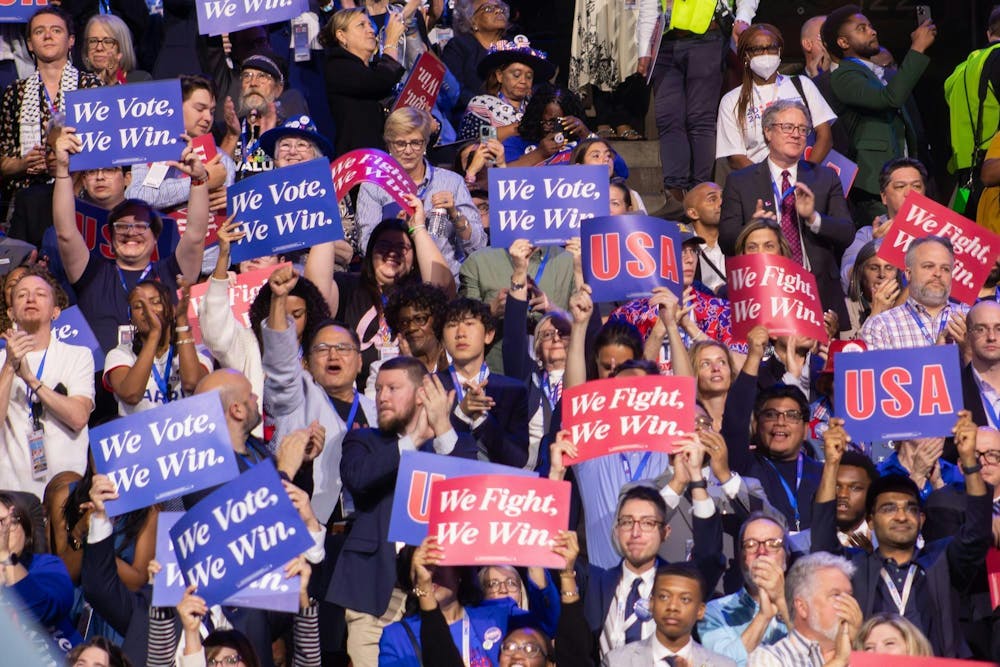When asked what went well for Hoosier Democrats last November, Monroe County’s new party chair Samuel Ujdak laughed for a solid five seconds. “Not a lot,” he said, chuckling.
It’s a common sentiment among national and particularly Hoosier Democrats as the party reckons with President Donald Trump’s electoral and popular vote victory in November. The party has not won a statewide race since 2012. Indiana shifted even further right last year.
So where does Democratic leadership go from here? Indiana may get a glimpse of the party’s future this weekend.
On Saturday, Indiana Democratic Party insiders will convene and choose a new chair. The race is highly contested, and five candidates have put their hat in the ring:
- Derek Camp, former Allen County Democratic Party chair
- Valerie McCray, 2024 U.S. Senate candidate
- Karen Tallian, former state senator from Northwest Indiana
- Darren Washington, Gary city councilor
- Destiny Wells, 2024 attorney general candidate
State and national politicking
The new chair will be selected by 18 district party chairs and vice chairs, among other representatives. Representing Monroe County will be Adam Dickey of New Albany, who was selected chair of the Ninth District Democratic Party last Saturday, and Bloomington City Clerk Nicole Bolden, who was selected vice chair.
Dickey didn’t say who he would vote for in Saturday’s selection. He wants to have fluid conversations with each candidate throughout the process.
But on the direction of the party, he said state Democrats need to recognize the disadvantage they’re at, refine their messaging and be more responsive to people’s needs.
Namely, he said those concerns include rising prices, cost of living, women’s rights and education, not to mention the local issues that make communities run day by day.
“A lot of our politics has been dominated by national politics, and I think that that's unfortunate,” he said. “Because in most cases what our local Democrats are working on is, ‘How do we fix the water? How do we make sure that the sewer runs, or the roads are repaired?’”
Bolden didn’t have time for an interview before deadline, and didn’t respond on who she’s supporting for the chair’s race.
Is the autopsy over yet?
When Monroe County Democrats convened for their first contested election — an intra-party vacancy caucus — after Trump’s victory in November, the party chose a labor leader in a three-round selection process.
To Ujdak, that result underscores a direction he wants the party to move toward in the future, toward the party’s labor focus that he said is decoupling from the party.
He said labor organizers, as the name implies, are skilled at organizing.
“But the core benefit there isn't like, ‘Oh, they're also good at organizing,’” he said. “The core benefit there is, like, ‘We believe in labor rights, we believe in fair compensation, we believe in safe working conditions.’”
There’s been a large debate on whether the Democrats should shift right on certain issues, left on others. Ujdak said he doesn’t think the party needs to move right on social issues as some have suggested. Most of the issues, he said, remain in messaging.
That means defining issues first, he said, before Republicans can.
“We need to get better at the actual active messaging,” Ujdak said. “We need to stop falling into this, frankly, pretty good rhetorical trap that they've built.”
Among the Democrats’ current strengths, he said, is the organization they’ve been able to build on the ground, especially in Monroe County. That means the metric boatload amount of volunteers, meeting people where they are in a literal sense.
Ujdak wants to continue that effort outside of campaign seasons too, encouraging local Democrats to volunteer and serve the community.
“Where the state party can help, where a new chair can help, is empowering people to get out there and figure things out and talk to the folks in their community and figure out what they need to talk about,” he said. “And then compiling that at the state level and building an effective state message around that.”
Building the party’s future
Anushka Pandey, a sophomore and president of College Democrats at IU, said the state party and new party chair, whoever they may be, need to focus on the next generation and widening the tent of the party further.
And like all who came before her in this article, she also wants a shift in messaging, toward a “common sense” approach. That also means broadening the message, she said, and loosening the requirements for what it means to be a Democrat.
“I think that something I've noticed even in, you know, as red state, is that we tend to have a really strict litmus test on what it means to be a Democrat,” Pandey said.
Still, she cited the party’s organization as a strength going forward, one she’d hope to see the next party chair improve upon statewide. She didn’t say who she’d support for the selection.
Pandey said for young people, the party’s message is fleeting. There was less focus on climate change this past election cycle, and generally, she said, less intent on issues that matter to young people.
“We haven't really had a reason to be engaged,” she said. “And I think that the longer we Democrats push that off, the worse it's gonna get electorally.”




